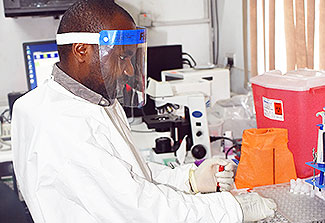Fogarty trainees involved in COVID-19 Trials
January/ February 2022 | Volume 21 Number 1
By Mariah Felipe
 Photo courtesy of UNCNumerous former Fogarty trainees have been using their expertise to study the effectiveness of COVID-19 vaccines and monoclonal antibody treatments at lowand middle-income country trial sites.
Photo courtesy of UNCNumerous former Fogarty trainees have been using their expertise to study the effectiveness of COVID-19 vaccines and monoclonal antibody treatments at lowand middle-income country trial sites.
As scientists watched the SARS-CoV-2 outbreak spread globally in late 2019, it became evident this pathogen had the potential to become the next pandemic. NIH quickly enlisted the expertise of infectious disease researchers worldwide, forming the COVID-19 prevention network (CoVPN) and tasking it with conducting Phase 3 efficacy trials for COVID-19 vaccines and monoclonal antibodies.
Many CoVPN investigators based in the U.S. and in low- and middle-income countries (LMICs) have received significant training through Fogarty programs over the last three decades and had gained expertise in infectious disease research with a particular focus on ending the HIV/AIDS epidemic. CoVPN is made up of longstanding research organizations including the HIV Prevention Trial Network (HPTN), HIV Vaccine Trial Network (HVTN), the AIDS Clinical Trials Group (ACTG) and the Infectious Diseases Clinical Research Consortium (IDCRC). CoVPN was established and is funded by the NIH’s National Institute of Allergy and Infectious Diseases (NIAID).
“The shovel-ready sites with infrastructure and investigators that were well-trained and knew how to conduct clinical research, all sprung from these relationships with the networks built with Fogarty over decades,” said Dr. Myron Cohen, HPTN principal investigator and director of global health at the University of North Carolina.
CoVPN investigators initially examined the effectiveness of face masks and social distancing in reducing the spread of SARS-CoV-2. The network also studied Novavax, AstraZeneca and Moderna vaccines, as well as the Lily and Regeneron monoclonal antibody combinations. CoVPN recently launched the first U.S. government-supported trial measuring the efficacy of the Moderna mRNA vaccine in adults living with HIV. The scientists expect to enroll about 14,000 volunteers at 54 clinical research sites in East and Southern Africa.
“Vaccination and treatment are critical for those who face the dual threat of HIV and COVID-19, as they remain at high risk of acquisition and transmission and potentially can be the origin of future variants,” according to Dr. Larry Corey, a CoVPN principal investigator. Although researchers stress they must not further stigmatize HIV, there are some important questions that merit study. How well do people with HIV respond to vaccination? Are monoclonal antibodies required for prevention of COVID among people living with HIV?
It’s important for NIH to support global research projects like those conducted by CoVPN for a number of reasons, according to Cohen. Increasing the number of research subjects being studied speeds discovery and allows scientists to study diseases that are prevalent elsewhere. “We see that when COVID-19 strikes, we can’t predict where it’s going,” Cohen said. “I think SARS-CoV-2 shines a light on the absolutely essential nature of having a global research network.”
One Fogarty alum playing a leadership role in CoVPN is its director of operations—Dr. Jim Kublin—who received a Fogarty career development award to advance his malaria research in 2000. Now a principal investigator at the Fred Hutchinson Cancer Research Center, Kublin said the grant was “instrumental” in enabling him to progress in his career and that his early studies of the molecular evolution and epidemiology of malaria have applications to COVID-19 today. “I think Fogarty and NIH are among the least appreciated national resources we have,” he said. “Both have a critical role to play in pandemic preparedness.”
CoVPN leaders agree that the SARS-COV-2 pandemic has highlighted the impact of Fogarty’s research capacity building programs and the need to expand the pipeline of global health researchers.
“The sites, the infrastructure, and the investigators that were well-trained and knew how to conduct clinical research are all a result of the networks built with Fogarty. It would have been impossible to have this without the investments that were made over decades,” said Cohen. “It could not have happened.”
More Information
To view Adobe PDF files,
download current, free accessible plug-ins from Adobe's website.